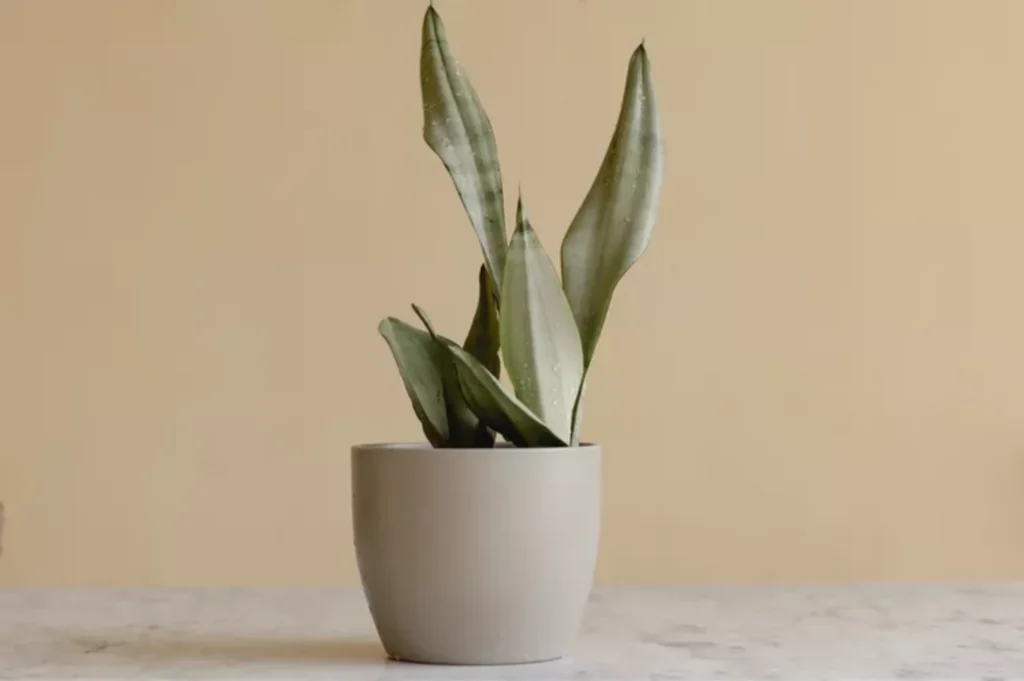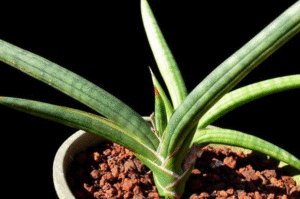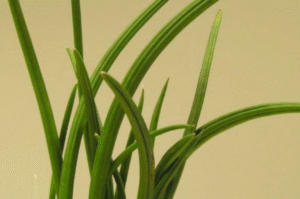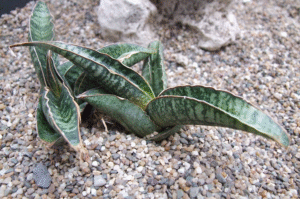If you’re a fan of low-maintenance houseplants with a modern aesthetic, Dracaena trifasciata ‘Silver Queen’ should be on your radar. Known for its silvery-gray, sword-like leaves, this unique variety of snake plant combines beauty with resilience, making it a top pick for both beginner and experienced indoor gardeners.
In this in-depth guide, we’ll review everything you need to know to successfully plant, grow, and care for the ‘Silver Queen’, from soil choices and lighting needs to troubleshooting and propagation.
Overview: Meet the ‘Silver Queen’
Previously categorized under the Sansevieria genus, the Dracaena trifasciata ‘Silver Queen’ is a stunning cultivar recognized for its shimmering silver foliage with subtle green accents. Unlike traditional snake plants with darker stripes, this one has a cleaner, more modern appearance (ideal for minimalist décor).
Key Details:
- Botanical Name: Dracaena trifasciata ‘Silver Queen’
- Common Name: Silver Queen Snake Plant
- Light Needs: Bright, indirect light (tolerates low light)
- Watering Needs: Infrequent (every 2–3 weeks)
- Mature Size: 2–3 feet tall
- Pet Safety: Toxic if ingested
How to Plant the ‘Silver Queen’
Proper planting is the first step toward a healthy, thriving plant. Here’s how to do it right.
Choosing the Right Pot
Always select a container with drainage holes. Terracotta pots are preferred because they help wick away excess moisture, reducing the risk of root rot.
Ideal Soil Mix
Use a well-draining mix, similar to what you’d use for succulents or cacti. A good DIY mix includes:
- 2 parts potting soil
- 1 part perlite
- 1 part coarse sand
This combination allows water to drain freely while giving roots plenty of air circulation.
Step-by-Step Planting Guide
- Add a thin layer of gravel or pebbles at the pot’s base for improved drainage.
- Fill half the pot with your soil mix.
- Position the plant and cover the roots with the remaining soil.
- Gently press the soil and water lightly, just enough to settle the roots.
Light, Water, and Temperature Requirements
This plant thrives with very little fuss. Here’s what it prefers:
Light
The Silver Queen enjoys bright, indirect light, though it will survive in lower light conditions. Avoid placing it in direct sunlight as this can bleach or scorch the leaves.
Tip: If the plant’s leaves lose color or look limp, it’s likely craving more light.
Watering
Overwatering is a common mistake. Allow the soil to completely dry before watering again.
- Spring/Summer: Every 2–3 weeks
- Fall/Winter: Once a month or less
Check with your finger: If the top 2 inches are dry, it’s time to water.
Temperature & Humidity
- Optimal range: 60–85°F (16–29°C)
- Humidity: Average household levels are fine
- Avoid: Cold drafts or placing near heating vents
Fertilizing Your Silver Queen
Feed the plant during the growing season with a balanced liquid fertilizer diluted to half strength.
- Frequency: Once a month (spring and summer)
- Skip feeding: During fall and winter, when growth slows
Repotting and Propagation
When to Repot
You don’t need to repot often. Do it every 2–3 years or when the roots start to crowd the pot.
Propagation Methods
Silver Queen can be propagated via:
- Leaf Cuttings: Cut a leaf into sections, let callous for a day, and plant in soil or water.
- Rhizome Division: The most efficient method. Separate the root clumps and plant them in individual pots.
Note: Leaf cuttings may not always produce the exact silver pattern, but divisions will.
Common Issues and Solutions
| Symptom | Likely Cause | Solution |
| Yellowing leaves | Too much water | Let the soil dry, reduce watering |
| Brown leaf tips | Dry air or chemicals in tap water | Use filtered water, and mist occasionally |
| Soft or mushy base | Root rot | Repot and remove affected roots |
| Lack of growth | Insufficient light or nutrients | Move to a brighter location, fertilize |
Styling and Placement Tips
The ‘Silver Queen’ fits beautifully in:
- Office desks – Need little attention
- Bedrooms – Act as a natural air filter
- Living rooms – Adds a modern, clean vibe
Pair it with a sleek white or charcoal pot for a minimalist look.
Frequently Asked Questions (FAQs)
Is the 'Silver Queen' snake plant toxic to pets?
Yes. It contains saponins that are toxic to cats and dogs if ingested. Keep it out of reach of curious pets.
How fast does 'Silver Queen' grow?
It’s a slow-growing plant. Expect visible growth during the spring and summer months, but don’t be surprised if it seems stagnant in winter.
Can it survive in a windowless room?
It can survive in low light, but for long-term health and better color, occasional exposure to indirect light is recommended.
What’s the difference between 'Silver Queen' and other snake plants?
The key difference lies in the color and leaf pattern. ‘Silver Queen’ has a unique silver-gray tone with less variegation, making it more refined compared to the common green or yellow-edged varieties.
Should I mist my 'Silver Queen'?
Not necessary. The plant tolerates dry air well. However, if your home is very dry, occasional misting can help reduce browning on leaf edges.
Conclusion: Is the Silver Queen Worth It?
Whether you’re a beginner plant enthusiast or a seasoned collector, Dracaena trifasciata ‘Silver Queen’ offers an unbeatable combination of beauty, durability, and ease of care. Its elegant, silvery foliage brings a calm, modern charm to interiors, while its ability to tolerate a variety of conditions makes it virtually foolproof.
For anyone looking to add a stylish yet tough plant to their collection, the Silver Queen is a five-star choice.






